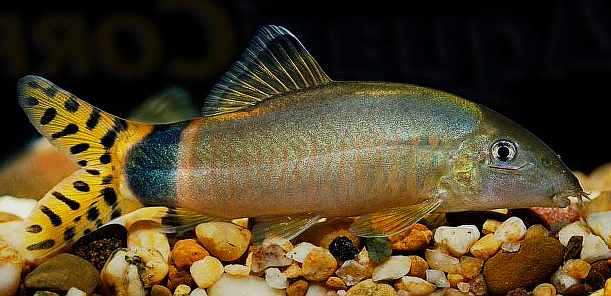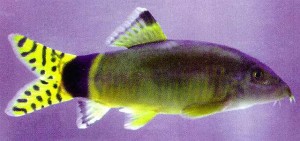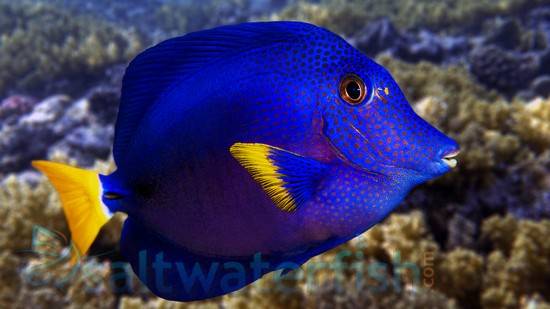The Jaguar Loach (Yasuhikotakia splendida) comes from a handful of localities in the Xe Pian river, a tributary system of the Xe Khong ,which itself drains into the Mekong river main channel, in the Champasak and Attapeu provinces of southern Laos.
The Jaguar Loach (Yasuhikotakia splendida) is more commonly referred to as the Yellow Tail Polka Dot Loach.
It has a large dark band that goes completely around its caudal peduncle that is outlined anteriorly and posteriorly by complete narrower pale rings. Its dorsal, anal and caudal fins are pale to bright yellow with distinctive round, oval or oblong dark spots on the caudal fin. It has a submarginal dark stripe on its dorsal and anal fins. The dorsal fin of the Jaguar Loach has eight branched rays and there are 14-19 narrow irregular bars on its side.
The Jaguar Loach is a shoaling species that does best in groups of at least 6 or more fish. They are an inquisitive, semi aggressive species that does best with their own kind and are probably not the best choice for a community tank.
Jaguar Loaches need at least a 55 gallon densely planted tank, aquascaped with a sand or fine gravel substrate, lots of smooth water worn rounded rocks, caves, and enough bogwood roots and branches to create several hiding places for the fish.
Like many other loaches they need highly filtered, well oxygenated water with a moderate current in the tank to mimic their natural environment. A power head or two with a venturi will handle this requirement. They are extremely intolerant to accumulations of organic waste and require spotless water conditions in order to thrive in an aquarium environment. Weekly 30-50% tank volume water changes should be considered routine maintenance.
Lighting for Jaguar Loaches should be relatively subdued, and plants like Microsorum, Taxiphyllum
or Anubias
spp. that can be can be attached to pieces of driftwood
or other décor in the tank to provide shade are good choices.
Since Jaguar Loaches are also avid diggers, they should be provided with a deep enough substrate to facilitate their activities.
The Jaguar Loach will eat sinking pellets, granules or wafers, live or frozen foods such as mosquito larvae, brine shrimp, Mysis shrimp and chopped prawns.
There have been no confirmed reports of Jaguar Loaches being been bred in captivity.
Minimum Tank Size: 55 gallon
Care Level: Moderate
Temperament: Semi aggressive
Aquarium Hardiness: Hardy
Water Conditions: 79-84°F, KH 8-18, pH 6.8-7.2
Max Size: 4″
Color Form: Tan, Yellow
Diet: Omnivore
Compatibility: Keep with other of same species
Origin: Southern Laos
Family: Cobitidae
Life Span: 8 – 15 years
Aquarist Experience Level: Intermediate




